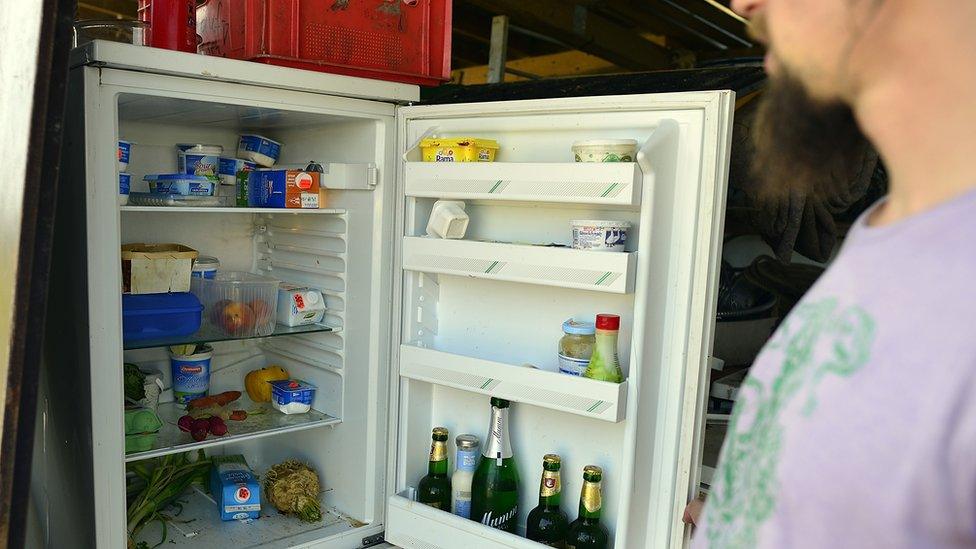Climate change: 'Monumental' deal to cut HFCs, fastest growing greenhouse gases
- Published

HFCs are commonly used in refrigerators and air conditioning systems
More than 150 countries have reached a deal described as "monumental" to phase out gases that are making global warming worse.
Hydrofluorocarbons (HFCs) are widely used in fridges, air conditioning and aerosol sprays.
Delegates meeting in Rwanda accepted a complex amendment to the Montreal Protocol that will see richer countries cut back their HFC use from 2019.
But some critics say the compromise may have less impact than expected.
Three-way deal
US Secretary of State John Kerry, who helped forge the deal in a series of meetings in the Rwandan capital, said it was a major victory for the Earth.
"It's a monumental step forward, that addresses the needs of individual nations but it will give us the opportunity to reduce the warming of the planet by an entire half a degree centigrade," he told BBC News.
US Secretary of State John Kerry urged delegates to adopt an ambitious deal
The new agreement will see three separate pathways for different countries.
Richer economies like the European Union, the US and others will start to limit their use of HFCs within a few years and make a cut of at least 10% from 2019.
Some developing countries like China, nations in Latin America and island states will freeze their use of HFCs from 2024.
What is the Montreal Protocol?
International treaty designed to protect the environment against the impact of harmful substances
Created in 1987 following the discovery of a large hole in the Earth's ozone layer over Antarctica
Came into force in 1989 with the main aim of ending the use of chlorofluorocarbons (CFCs)
CFCs replaced by hydrofluorocarbons (HFCs)
Amendment proposed after scientists discovered that, while they pose no threat to the ozone layer, HFCs contribute to global warming by trapping heat radiating off the Earth
The protocol has undergone a number of revisions since it was introduced and has been successful in eliminating more than 100 fluorinated gases
Other developing countries, specifically India, Pakistan, Iran, Iraq and the Gulf states will not freeze their use until 2028.
China, the world's largest producer of HFCs, will not actually start to cut their production or use until 2029.
Air conditioning units were needed at the conference in Kigali as negotiations dragged into the night
India, will start even later, making its first 10% cut in use in 2032.
"Absolutely it's a historic day," said Durwood Zaelke, from the Institute for Government and Sustainable Development (IGSD), a long time participant in the Montreal Protocol talks.
"We came to get a half a degree of warming out of the system and we are going to walk away with about 90% from the Kigali amendment."
Certainly if the agreement is implemented in full it will make a big difference to global warming. Experts estimate it will remove the equivalent of about 70 billion tonnes of carbon dioxide from the atmosphere by 2050.
"HFCs posed an immediate threat to a safe climate due to their increasing use and high global warming potential, thousands of times more potent than carbon dioxide," said Christian Aid's Senior Policy Advisor, Benson Ireri.
"By agreeing to an early HFC phase down schedule, we've bought ourselves a bit more time to shift to a global low carbon economy and protect the world's most vulnerable people."
The deal will mean that new refrigerators will use less harmful cooling gases in the future
But some observers questioned the concessions made to India and China, suggesting they had weakened the overall impact. The target of cutting global warming by 0.5 degrees may not be realised.
"They needed an agreement here as it's seen as an Obama legacy, so the US delegation has been pretty aggressive in making China and India get to an agreement," said Paula Tejon Carbajal from Greenpeace International.
"It's an incremental step towards 0.5 degrees but its not there yet, they say that the market will work to get us there, but we are not there yet."
The US Secretary of State believes that the science underpinning the deal is sound. He is confident that it will have a huge impact on warming.
"I feel very positive about where we are, we ran all the numbers and everybody feels confident that the integrity of the substance of this is there," he told the BBC.
Supporters argue that this agreement in Kigali will build on the foundations laid by the Paris climate agreement, signed by over 190 countries last December, and which becomes operational early in November.
They also point to the past history of the Montreal Protocol - over 100 fluorinated gases have been eliminated in the agreement's 30 year history. Once the regulation has been passed, industry rapidly develops alternatives.
"The market is going to wash over India, and will sweep them along, they will make the transition a lot faster than the number they put up," said Durwood Zaelke.
"Phase-outs have always driven the market transition so the laggards will be moved along by the market."
There was a sense of quiet jubilation among delegates here when the deal was finally gavelled through in the early hours of Saturday morning.
'It's a big deal," one observer said, "but it could have been bigger."
Follow Matt on Twitter @mattmcgrathBBC, external and on Facebook, external.
- Published26 November
- Published8 November